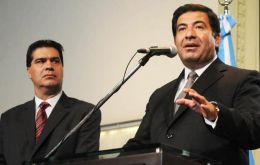MercoPress. South Atlantic News Agency
Tag: Axel Kicillof
-
Friday, March 28th 2014 - 06:22 UTC
Argentine economy expands 3%, thus saving 3.5bn in payments to bonds tied to GDP

Argentina's National Institute of Statistics and Census, Indec, announced that the country's GDP grew by 3% across the last calendar year, dropping short of the figure necessary to service bonds linked to the nation's economic activity.
-
Tuesday, March 18th 2014 - 02:31 UTC
Official inflation in Argentina during February, 3.4% and 7.1% in two months

Inflation in Argentina during the month of February reached 3.4%, which means that in the first two months of the year the index stands above 7.1%, according to the latest figures released by the country's National Institute of Statistics and Census' (INDEC) Consumer Price Index.
-
Tuesday, March 11th 2014 - 06:44 UTC
Argentina with no serious economic problems, “just complexities and challenges”

Economy Minister Axel Kicillof argued that Argentina does not have serious economic problems, but rather “complexities, difficulties and challenges,” and accused economists and dissident media outlets of orchestrating a campaign to generate an “end of the world” feeling among members of society.
-
Monday, February 10th 2014 - 03:42 UTC
“Argentina's economy on the right course” K ambassador tells the Washington Post

Argentina's reactions to the country's image in the US and particularly that of President Cristina Fernandez administration economic policies have not ceased. This time it was ambassador before the US government, Cecilia Nahón who strongly replied the terms of an editorial from The Washington Post anticipating “Argentina's coming collapse”.
-
Wednesday, February 5th 2014 - 23:43 UTC
Paris Club prepared for talks with Argentina over debt repayment

The Paris Club is open to talks with Argentina on repaying its debt, the group of creditor nations said on Wednesday, moving closer towards launching formal negotiations with Buenos Aires.
-
Wednesday, January 29th 2014 - 21:00 UTC
New York Times blasts Cristina Fernández: “Argentina on the brink”

The New York Times published on Wednesday a very strong editorial criticizing the misguided policies of the government of President Cristina Fernandez, arguing that once again 'Argentina is on the brink”.
-
Tuesday, January 28th 2014 - 05:34 UTC
NY Times: the influential Minister behind Argentina’s economic shift

The following piece from The New York Times, written by Simon Romero and Jonathan Gilbertjan gives an insight into the life and thinking of the most powerful Economics minister Argentina has had in a decade: Axel Kicillof and the brains behind the current rather eclectic policies.
-
Tuesday, January 28th 2014 - 05:05 UTC
Argentine market cautious reaction to new rules on foreign exchange and dollar savings

In what promises to be a week of surprises as the Argentine government unfolds measures to contain the price of the US dollar, this Monday the peso held relatively stable after last week's sharp devaluation. While the official rate remained unchanged at 8.01 Pesos for a greenback, in the parallel market it climbed to 12.15 Pesos.
-
Thursday, January 23rd 2014 - 10:27 UTC
Paris Club will study Argentina's repayment proposal; long process expected

The Paris Club said it would study an outline from Argentina for repaying the more than 9.5 billion dollars it owes the group of creditor nations. Argentina is eager to resolve the problem of its outstanding debt with the group in order to regain access to international capital markets from which it has been shut out since its 2002 default.
-
Tuesday, January 21st 2014 - 15:43 UTC
Argentina in France trying to work out a debt deal with the Paris Club

Desperately credit-short Argentina outlined on Monday its conditions for repaying some 9.5 billion dollars in debt to the Paris Club, a senior official at the group of creditor nations said, as the government of President Cristina Fernandez seeks to revive long-stalled talks. Argentina's international reserves have fallen to its lowest level since 2006.
